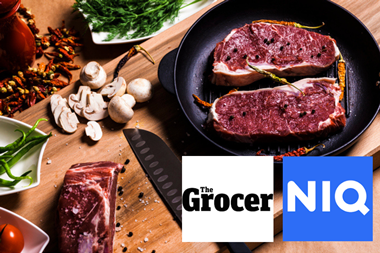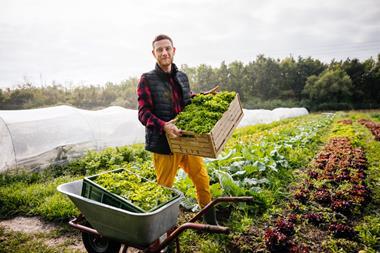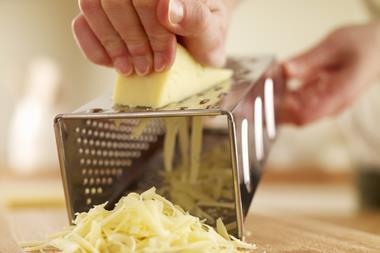Is 2009 the year that consumers finally fall out of love with organic food? Analysts believe that the jury is still out, but the sector is certainly showing signs of serious slowdown.
According to the Soil Association, the last decade has seen sales of organic produce rise by an annual average of 26%. But in 2008 the sales surge slowed to a trickle. In March this year economic uncertainty saw Mintel revise down its forecast for 2009, with new figures estimating that the sector is worth £1,546m.
Mintel says that during an economic downturn shoppers are likely to strike organic products off shopping lists in favour of what they see as better-value fare. And conscientious consumers are managing to trade down while maintaining their ethical stance by switching to free range, fair trade and locally-produced options.
After nearly a decade of positive press, organic is facing a challenge in the media as well as at the tills. This year the Food Standards Agency hit the headlines with a report claiming that organic produce is neither safer, nor more nutritious, than conventionally grown food.
Claire Nuttall, client director at brand insight specialist Dragon Rouge, believes that brands will have to come out fighting if they want to convince consumers and c-store managers that organic can still earn its place on the shelves.
"When times are tough consumers rationalise what they buy in certain categories, so organic brands need to become indispensable," she says. "Products and brands which do not deliver a specific benefit over and above a mainstream non-organic equivalent apart from the organic 'feel-good factor' will be challenged. These categories include confectionery, crisps, nuts and ready meals, which TNS says are already experiencing significant decline."
So, is it worth c-store operators standing by organic for economic, as well as environmental reasons?
IGD's latest research suggests that there's still a strong groundswell of support for the sector, with one in five UK consumers maintaining their spend in organic. A further one in 10 say they will buy more organic food in the future, once they have a little more money to spend. "Producers of organic foods have invested heavily in developing their proposition and are unlikely to yield this market without a fight," says IGD chief executive Joanne Denney-Finch.
Best of all for c-stores, the research identifies organic supporters as 'young and affluent', exactly the customers that are needed to increase till-ring.
"Traditionally, organic has been positioned by producers, and perceived by shoppers, as a premium product offering a range of values including animal welfare, environmental benefits, superior quality and taste," continues Denney-Finch.
"Shoppers have not performed a u-turn on ethics, so the challenge for organic is to make sure that communication of its benefits is clear and consistent. If they get that right, it would be sensible to assume that volume sales could pick up as the economy recovers."
Steve Clarke, marketing director at organic dairy brand Rachel's, agrees that there's more work to be done on educating the public about organic's various benefits.
"There is still confusion surrounding organic food," he says. "It's less tangibly understood than fair trade, for example, and therefore people may be less willing to pay a premium."
To boost public awareness, Rachel's is part of a cross-industry strategy to fund a £1m generic organic marketing campaign due to be launched in autumn 2010.
For c-store managers looking to find a way into the organic market, sticking to basic everyday essentials, such as organic bread and dairy, may help gauge local demand while minimising risk.
Some bigger brands have diversified to offer organic alternatives to their own best-sellers. For example, Heinz launched Organic Baked Beanz to complement its traditional range.
For many c-stores, stocking organic dairy products seems to be the best bet, since Mintel says the sales of yogurts and desserts are making dairy the fastest-growing category. However, this may change very rapidly as the price of organic milk rises in the future and farmers consider switching back to more conventional production methods as a result.
To maintain momentum, the Organic Milk Supplier Cooperative (OMSCO) has launched a £1m marketing campaign, aimed at ABC1 mums, which will run across print, TV and the internet. The campaign promotes organic milk as a cost-effective proposition for families.
Meanwhile, there's always the potential for c-stores to tap into the current trend for local food, and grow their organic sales by aiming to stock organic products from regional manufacturers.
According to the Soil Association, the last decade has seen sales of organic produce rise by an annual average of 26%. But in 2008 the sales surge slowed to a trickle. In March this year economic uncertainty saw Mintel revise down its forecast for 2009, with new figures estimating that the sector is worth £1,546m.
Mintel says that during an economic downturn shoppers are likely to strike organic products off shopping lists in favour of what they see as better-value fare. And conscientious consumers are managing to trade down while maintaining their ethical stance by switching to free range, fair trade and locally-produced options.
After nearly a decade of positive press, organic is facing a challenge in the media as well as at the tills. This year the Food Standards Agency hit the headlines with a report claiming that organic produce is neither safer, nor more nutritious, than conventionally grown food.
Claire Nuttall, client director at brand insight specialist Dragon Rouge, believes that brands will have to come out fighting if they want to convince consumers and c-store managers that organic can still earn its place on the shelves.
"When times are tough consumers rationalise what they buy in certain categories, so organic brands need to become indispensable," she says. "Products and brands which do not deliver a specific benefit over and above a mainstream non-organic equivalent apart from the organic 'feel-good factor' will be challenged. These categories include confectionery, crisps, nuts and ready meals, which TNS says are already experiencing significant decline."
So, is it worth c-store operators standing by organic for economic, as well as environmental reasons?
IGD's latest research suggests that there's still a strong groundswell of support for the sector, with one in five UK consumers maintaining their spend in organic. A further one in 10 say they will buy more organic food in the future, once they have a little more money to spend. "Producers of organic foods have invested heavily in developing their proposition and are unlikely to yield this market without a fight," says IGD chief executive Joanne Denney-Finch.
Best of all for c-stores, the research identifies organic supporters as 'young and affluent', exactly the customers that are needed to increase till-ring.
"Traditionally, organic has been positioned by producers, and perceived by shoppers, as a premium product offering a range of values including animal welfare, environmental benefits, superior quality and taste," continues Denney-Finch.
"Shoppers have not performed a u-turn on ethics, so the challenge for organic is to make sure that communication of its benefits is clear and consistent. If they get that right, it would be sensible to assume that volume sales could pick up as the economy recovers."
Steve Clarke, marketing director at organic dairy brand Rachel's, agrees that there's more work to be done on educating the public about organic's various benefits.
"There is still confusion surrounding organic food," he says. "It's less tangibly understood than fair trade, for example, and therefore people may be less willing to pay a premium."
To boost public awareness, Rachel's is part of a cross-industry strategy to fund a £1m generic organic marketing campaign due to be launched in autumn 2010.
For c-store managers looking to find a way into the organic market, sticking to basic everyday essentials, such as organic bread and dairy, may help gauge local demand while minimising risk.
Some bigger brands have diversified to offer organic alternatives to their own best-sellers. For example, Heinz launched Organic Baked Beanz to complement its traditional range.
For many c-stores, stocking organic dairy products seems to be the best bet, since Mintel says the sales of yogurts and desserts are making dairy the fastest-growing category. However, this may change very rapidly as the price of organic milk rises in the future and farmers consider switching back to more conventional production methods as a result.
To maintain momentum, the Organic Milk Supplier Cooperative (OMSCO) has launched a £1m marketing campaign, aimed at ABC1 mums, which will run across print, TV and the internet. The campaign promotes organic milk as a cost-effective proposition for families.
Meanwhile, there's always the potential for c-stores to tap into the current trend for local food, and grow their organic sales by aiming to stock organic products from regional manufacturers.

























No comments yet